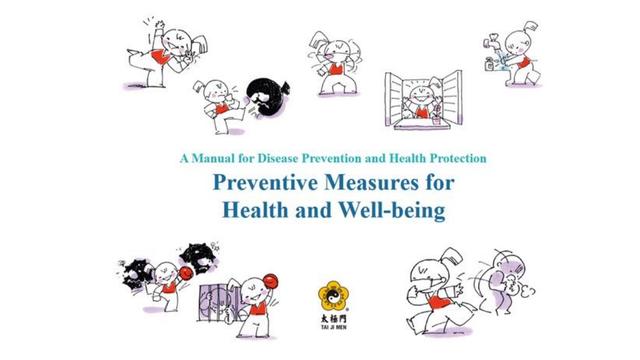Dr. Hong’s teachings on the primacy of conscience also inspired Tai Ji Men’s campaign of prevention and awareness during the pandemic.
by Tsai Cheng-An*
*A paper presented at Session 12, “New Religious Movements in Taiwan,” of the 4th annual meeting of EASSSR, the East Asian Society for the Scientific Study of Religion, Taipei, August 13, 2022.

Introduction
In 2015, the United Nations indicated the pursuit of peace and justice among its Sustainable Development Goals. They identified sustainable development, peace, and human rights as the three main axes of the United Nations’ work.
The COVID-19 pandemic had a disastrous impact on people’s lives and sustainable development efforts. The COVID-19 pandemic is the greatest challenge to humanity since the 1918 epidemic of influenza. The United Nations’s 2021 SDG report states: “As we enter the second year of the COVID-19 pandemic, it is clear that this is a crisis of enormous proportions, with disastrous effects on people’s lives and livelihoods and on efforts to achieve the 2030 Agenda for Sustainable Development.”
According to the World Health Organization (WHO), as of July 10, 2022, there had been more than 551 million cases of COVID and 6.35 million deaths worldwide.
Studies have shown that COVID-19 causes five types of associated distress: (a) fear of the dangers of COVID-19, (b) fear of the socioeconomic costs of COVID-19, (c) xenophobia against foreigners allegedly spreading the disease, (d) traumatic stress symptoms associated with direct or indirect exposure to COVID-19, and (e) compulsive testing and search for reassurance associated with COVID-19. The COVID-19 pandemic brought not only physical suffering, but also economic and psychological distress.
On the other hand, pandemics provide an opportunity to reflect on transcendent life. Because of the fear, panic, and uncertainty associated with them, pandemics make it easier for people to seek religion or belief as a source of reliance. The hope and trust that society places in religious or belief communities makes these the ultimate institutions in times of epidemic, providing comfort to millions of people affected by the pandemic, and asking questions that scientists and politicians cannot immediately answer.
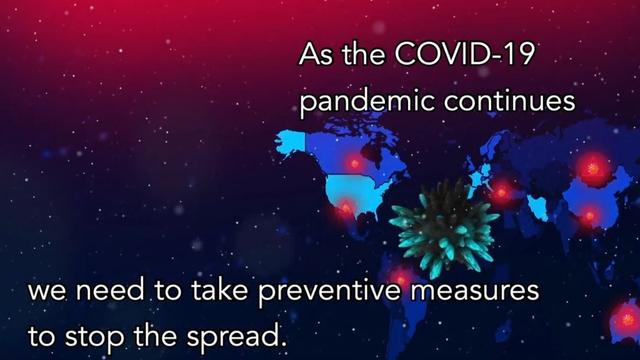
COVID-19 also had an impact on the work of Tai Ji Men, a spiritual movement headquartered in Taiwan. Tai Ji Men is also well-known for its international efforts promoting a culture of peace and love, and emphasizing the centrality of conscience. Tai Ji Men was the victim of a politically motivated crackdown in 1996, which continues to our very days as tax harassment and the issuance and the enforcement of ill-founded tax bills. While the COVID crisis restricted some of its activities, Tai Ji Men dizi (disciples) continued their main efforts both to spread internationally a culture of peace, love, and conscience, and to gather international support for their fight against the injustices vested on them.
In this paper, I will first discuss the foundation of what Tai Ji Men call their “culture of conscience, love, and peace,” then show how it was at work during the COVID-19 pandemic.
Tai Ji Men’s Culture of Yin and Yang Wisdom, Love, and Peace
What dizi call “Tai Ji Men’s Culture of Yin and Yang Wisdom, Love, and Peace” is an important pillar of cultural ecology. Tai Ji Men’s Movement of An Era of Conscience links cultural ecology to environmental ecology, and believes it can create a better environment for the world. The project “Tai Ji Men Advocates Conscience to Be Safe in the Pandemic” links cultural ecology and environmental ecology to the ecology of human life, putting into practice “yin and yang wisdom, love, peace, and conscience” in daily life.
Because of its own dramatic experiences, Tai Ji Men also increasingly sees itself as a watchdog of human rights and freedom of religion, which are enshrined in the United Nations’ fundamental documents. Tai Ji Men thus advocates for transitional justice and tax reform in Taiwan, in a context where human rights are still frequently violated, particularly in the tax field. By doing this, dizi believe they affirm the principle of common good and justice for all generations.
Pope Francis’ 2015 encyclical letter, “Laudato Si’: Caring for Our Common Home,” also focuses on the environmental dimension of sustainable development. The Pope states that the most urgent challenge is to protect “our common home.” It also points out the three dimensions of integral ecology: environmental ecology, cultural ecology, and the ecology of human life. This vision of integral ecology is further linked to the principle of the common good and the justice of all generations.

Tai Ji Men is an ancient menpai (similar to a school) of qigong, martial arts and self-cultivation, organized as an international non-profit cultural and spiritual organization. The culture of Tai Ji Men is deeply rooted in traditional Taoism, the philosophy of Yin and Yang, although it is opened to dizi of all religions. The Shifu (Grand Master) of Tai Ji Men, Dr. Hong Tao-Tze, teaches his dizi how to put the culture of conscience, love, and peace into action, particularly when disasters strike.
After three major earthquakes in 1999 in Colombia, Turkey, and Taiwan, Dr. Hong held the “World Love—A Night of Prayer” event on September 25, 1999. Nearly 40,000 people, including religious leaders, prayed together. Dr. Hong issued a declaration of “World Love and Peace” to remind the world to respect life and protect nature, and launched a global sign-up campaign. The declaration states that the world will soon return to a peaceful situation free of sorrow, fear, war, and suffering.
Dr. Hong also presented the idea of the “Bell of World Peace and Love.” He made it clear that bells have a special meaning in both Western and Eastern traditions. He said, “The bells in Western churches and Eastern temples remind people to listen to their inner voices. The bells represent the true heart of people, social harmony, the success of a nation, and world peace.”
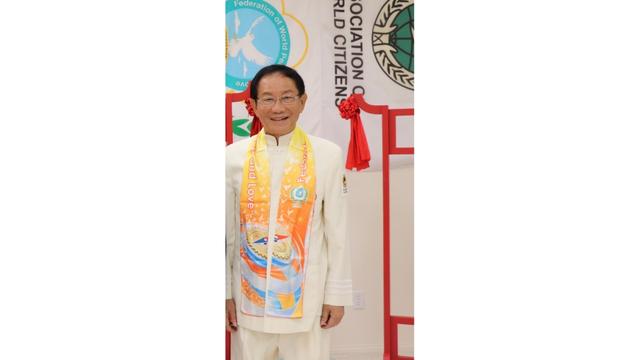
At the heart of the Tai Ji Men worldview is the harmony between yin and yang, heaven and earth, and mind and qi (energy) that was part of the original purity of humanity. Although it was later lost, it can be restored together with peace. Ringing the Bell is part of a movement to restore the world and humanity to its original purity.
Tai Ji Men’s master and disciples continuously travel to the five continents to engage in cultural exchanges for peace. Dr. Hong shares with global leaders the wisdom of the Tai Ji philosophy of yin and yang and their balance. For example:
- In 2000, Tai JI Men was invited to conduct a cultural event at the Sydney Opera House during the Olympic Games, and presented the “Night of Ancient Cultures” cultural exhibition. The Governor of New South Wales, Gordon Jacob Samuels, rang the World Love Peace Bell and made a peace wish.
- In 2001, the 54th Annual United Nations DPI/NGO Conference was held in New York. Dr. Hong was invited to speak and brought his disciples with him to visit the United States. After witnessing the 9/11 terrorist attacks, New York was plunged into extreme fear; many were desperate and tried to flee. Dr. Hong led his disciples to invite guests from all over the world to come and ring the Bell and pray for the world. For three consecutive days in September, 16 ambassadors and NGO leaders, including Dr. Dinesh Ramjattan, former minister and advisor to the Prime Minister of Mauritius, and Mr. Abuzaid Omar Dorda (1944–2022), the ambassador of Libya to the United Nations, rang the Bell. Tai Ji Men believe this helped stabilize people’s hearts at this critical moment.
- On June 15, 2005, when Pope Benedict XVI took office, Dr. Hong was among those greeting the Pope in St. Peter’s Square. Dr. Hong presented the Pope with the “Universal Declaration of Love and Peace” and other material that had been sent to many heads of state and to UN Secretary General Kofi Annan.
- By July 2022, Dr. Hong’s World Tours of Love and Peace had visited more than 100 different countries, making them one of the largest citizen diplomacy campaigns in the world today. Tai Ji Men dizi are not professional diplomats, but they work as citizen diplomats through friendship and culture.

At the 60th Annual United Nations DPI/NGO Conference in 2007, Dr. Hong presented a paper on “The Key to Change the Destiny of the World: How One Good Thought Can Improve the World.” He said that, “The good qi brings the opportunities for change and this is the key to change the world. If everyone turns to good thoughts, then we can change the world. If everyone is committed and gathers the positive energy of good intentions and positive thoughts, we will have a safety net.”
On May 18. 2008, Dr. Hong wrote an open letter to the heads of state of several countries and United Nations Secretary-General Ban Ki-moon. He stated, “It has been a painstaking endeavor to lead Tai Ji Men dizi (practitioners) and people towards betterment and enlightenment in a world of materialism. I have tirelessly committed myself to this goal over the past forty years. It is my wish that all the world citizens can be inspired with never ending patience in the world. I believe more world citizens will pass down the true heart to world citizens of the next generation when they receive and understand this message. I firmly believe that ‘the strength of heart is stronger than steel; the function of heart is beyond limit.’ If we don’t think something is difficult in our heart, then there is no such thing as difficulty.”
Dr. Hong also called on the United Nations and heads of state to encourage the world to grow edible food and to stop feeling anxious about food shortages.
In 2014, Tai Ji Men Qigong Academy, the United Nations NGO World Citizens Association, and the Federation of World Peace and Love jointly launched the international public service campaign “An Era of Conscience” (ANEOC), hoping that the world’s citizens will cross the barriers of race, culture, and national boundaries and pray and work together to balance the global environment crises.
The 66th United Nations DPI/NGO Conference 2016 was held in Gyeongju, Korea, where 17 Sustainable Development Goals (SDGs) were announced. Dr. Hong spoke on “Hope for Global Citizenship Through Conscience, Education and Culture,” stating, “Heart is the anchor of life. It holds the key to change the destiny of an individual and the world. As more global citizens have their conscience awakened, a safer environment will be achieved.
The more positive energy the world has, the fewer atrocities will be committed, saving the world from continued degradation of the natural environment. Conscience elevates humanity, as surely as yeast raises bread and is the key to save the world. Good conscience will continue to be fermented in our hearts, extolled and spread to benefit the world and its people (…) By placing ‘conscience’ at the apex on the top, ‘culture’ and ‘education’ at the base, a platform to sustainability is established with stability and balance.”
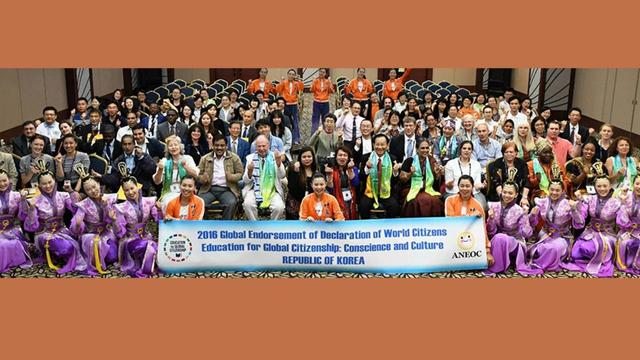
According to Dr. Hong, “conscience is the goodness in human nature, which through education and self-awareness can stop evil and spread goodness to benefit our society, country and the world. When conscience is awakened in our hearts and balance is restored, peace will not be far away. The ultimate clarity and goodness of the heart is a fountain of wisdom. Be it the clarity to deal with people, to live life, or the wisdom to run a government and manage a nation, you will find it in the heart. Once the heart is anchored firmly, we will gain control in all circumstances.”
Dr. Hong’s efforts were eventually successful and led to the proclamation of an International Day of Conscience by the United Nations. On July 25, 2019, during the 73rd United Nations General Assembly, through a resolution submitted by the Kingdom of Bahrain, entitled “Promoting a Culture of Peace through Love and Conscience,” the United Nations officially declared April 5 as International Day of Conscience.
In April 2022, in commemoration of the United Nations resolution to establish an International Day of Conscience, Dr. Hong said, “Conscience is the lighthouse of the soul, providing hope and direction to sailors sailing on a dark sea. A society with an awakened conscience will have a stronger unifying force to break through the current darkness.”
As of July 30, 2022, the International Day of Conscience Declaration has been translated into 53 languages and signed by people in 200 countries.
Tai Ji Men’s Campaign for Conscience and COVID-19
When SARS ravaged Taiwan in 2003, Dr. Hong instructed his disciples to compile a “Health Handbook for Prevention of the Epidemic,” with “three no’s”: no anger, no worries, and no stress; and “five more’s”: more hand washing, more warm water, more exercise, more joy, and more precautions. The then Taiwan’s Director of Health, Chen Chien-jen, who became the 14th Vice President of the Republic of China, stated, “I think it’s great that Tai Ji Men can cooperate with the Department of Health to organize this activity of a ‘New Concept of Health and Prevention of Disease’!”
During the two years of COVID-19, Taiwan’s performance has been praised as specially effective. and has contributed to the world’s epidemic prevention. Despite the continuing tax harassment and persecution, Tai Ji Men contributed to this effort. It brought into play the wisdom of yin and yang, based on the principle that “the best vaccine is conscience.”
During the pandemic, Tai Ji Men insisted that people should live first with conscience and honesty, and this would strengthen their physical and mental immunity. Tai Ji Men called to work together to overcome the epidemic, with the compassion to atone for sins and do good. Dizi believe that Tai Ji Men’s actions created a butterfly effect of goodness throughout the world, as the positive energy of life they transmitted filled countries and cities with hope.

When the COVID-19 pandemic started in early 2020, Dr. Hong called for “a global consensus to be saved from the epidemic; we all come together and unite to fight the virus; we spread the tips to prevent the epidemic; we pray for God’s mercy and an early end to the epidemic.” Dr. Hong led his disciples to do more good deeds, starting with themselves, and to use positive energy to enhance the immunity of the group. “The vaccine is the remedy, conscience is the root; do the right thing with conscience, respect all living things on earth, and face the difficulties together with love and solidarity. We will guide people to live with conscience and honesty to strengthen the immunity of the body, mind and soul, and to join hands to overcome the epidemic with the compassion to atone for sins and do good deeds.”
Since February 8, 2020, Tai Ji Men has published a full-page epidemic prevention newsletter in Taiwan’s New Life newspaper, bringing together 74 Tai Ji Men disciples, Western health care professionals, and experts from various fields to publish 26 newsletters, offering epidemic prevention advice to the nation, as well as the concept of “Three No’s, Five More, and Six Best Tips,” a 123-part epidemic prevention animation. The epidemic prevention and health care newsletter has been sent to village leaders, public opinion representatives at all levels, and county and township leaders throughout Taiwan.
For World Day of Conscience 2020, April 5, Tai Ji Men carefully compiled a “Health Care Handbook” and shared the “Three No’s, Five More’s and Six Best Tips” to the world, including to heads of state and the governors of the 50 U.S. states, as part of the response activities.

In 2022, viruses are changing rapidly, and the Tai Ji Men trilogy of films on immunity, prevention, and anti-viral warfare continues to be released, emphasizing the wisdom of balancing mind and body, and especially the importance of conscience. To this day, Tai Ji Men continues to call on the world to act with conscience to create well-being for ourselves and others. To date, more than 200 countries and regions around the world have received health videos from Tai Ji Men, combining Eastern health wisdom with Western medical knowledge to help people create a comprehensive health shield for mind, body, and spirit.
The main concepts of Pope Francis’ encyclical letter on ecology are centered on the responsibility to protect the earth and to ensure its fruitfulness for future generations. Francis mentions that concern for the environment must be accompanied by concern for social issues. The letter then turns to the question of governance, discussing potential ways to engage in dialogue and action at the global and local levels.
The encyclical letter was written before COVID-19, but its core concepts may also help in confronting the pandemic. My research on Tai Ji Men and COVID-19 has demonstrated that Dr. Hong and his dizi continued to be active in the three or perhaps four fields of ecology mentioned by Pope Francis: environmental ecology, cultural ecology, ecology of human life, and ecology of political institutions for the common good.
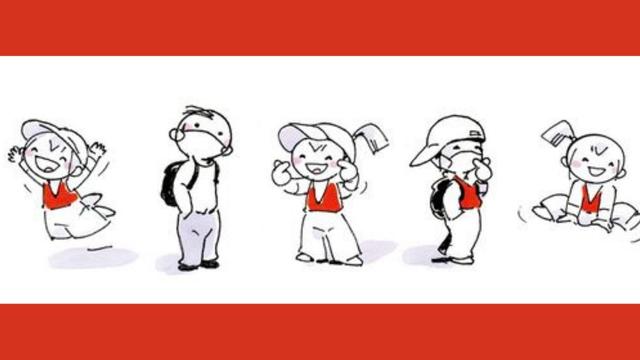
They have promoted a healthy environment for resisting and overcoming the pandemic, but have also emphasized the central role of conscience and a culture of care and responsibility to respond to COVID-19. And they have insisted that, while at first sight the Tai Ji Men case arising from the unjust persecution of the movement and COVID-19 are two separate fields, in fact a connection exists. An integral ecology involves sanitizing the institutions as well. Corrupt institutions do not protect their citizens from injustice and will not be able to protect them from COVID-19 either. Conversely, promoting justice and institutions really working for the common good will also benefit the fight against COVID.
Tai Ji Men master and disciples continue to experience these joyous and painful processes in a very personal way. They are persuaded they fight for the world, for society, for Taiwan, for justice, and, more broadly, for a better environment.
Source: Bitter Winter

